As Australia emerges from the COVID-19 pandemic, Grattan Institute has chosen six books for the Prime Minister to read over the summer break.
This year’s list covers a wide range of important issues including the disparity between private and public education systems; land use and the environment; grief, loss, and the female voice; poverty; sovereignty of the First Nations of Australia; and technology’s impact on our lives, our politics, and our values.
We are delighted to announce Grattan Institute’s top six books for 2021:
- The Winter Road: A Killing at Croppa Creek, by Kate Holden
- The School: The Ups and Downs of One Year in the Classroom, by Brendan James Murray
- Truth-Telling: History, Sovereignty, and the Uluru Statement, by Henry Reynolds
- On Money, by Rick Morton
- System Error: Where Big Tech Went Wrong and How We Can Reboot, by Rob Reich, Mehran Sahami, and Jeremy M. Weinstein
- She Is Haunted, by Paige Clark
You can purchase any of these books on our Readings collections page.
We’ve chosen these diverse works for their readability and relevance to Australian public policy. As always, it was a rigorous selection process: the Grattan staff book club considered an extensive array of Australian and international books, essays, papers, and reports, and it was a tough choice because the work published this year has been outstanding.
Grattan CEO Danielle Wood says: ‘This year’s list explores issues that have been, to some degree, overshadowed by the COVID-19 pandemic.
‘The Prime Minister has been hard at work for the past two years, helping to navigate the nation through the biggest health crisis the world has seen in more than a century. But now we’re finally returning to a degree of normalcy, there remains challenges on the other side – some that have been exacerbated by the pandemic – that cannot be ignored.
‘COVID-19 has shone a harsh light on many issues that affect who we are and the way we live: disadvantages within the public education system; the shameful treatment of Indigenous people, including during the COVID vaccination rollout; our unhealthy reliance on a small handful of big tech firms.
‘And, as the queues of newly unemployed workers snaking around Centrelink offices in March last year reminded us, poverty and entrenched economic inequality are deeply felt by many Australians. Unforgivably, the most disadvantaged are being left behind by a nation surging ahead.
‘This is the perfect time for Mr Morrison to take stock as he takes a quick break and prepares for the 2022 election. These books offer hard truths, but also constructive ideas.’
Grattan recommends these books to the Prime Minister, but also to all Australians, as engaging reads for the summer holidays. And in addition to our main Summer Reading List, our annual Wonks’ List gives our selection of the year’s best technical policy reads, for anyone who wants to take a deeper dive.
The Winter Road: A Killing at Croppa Creek
Kate Holden
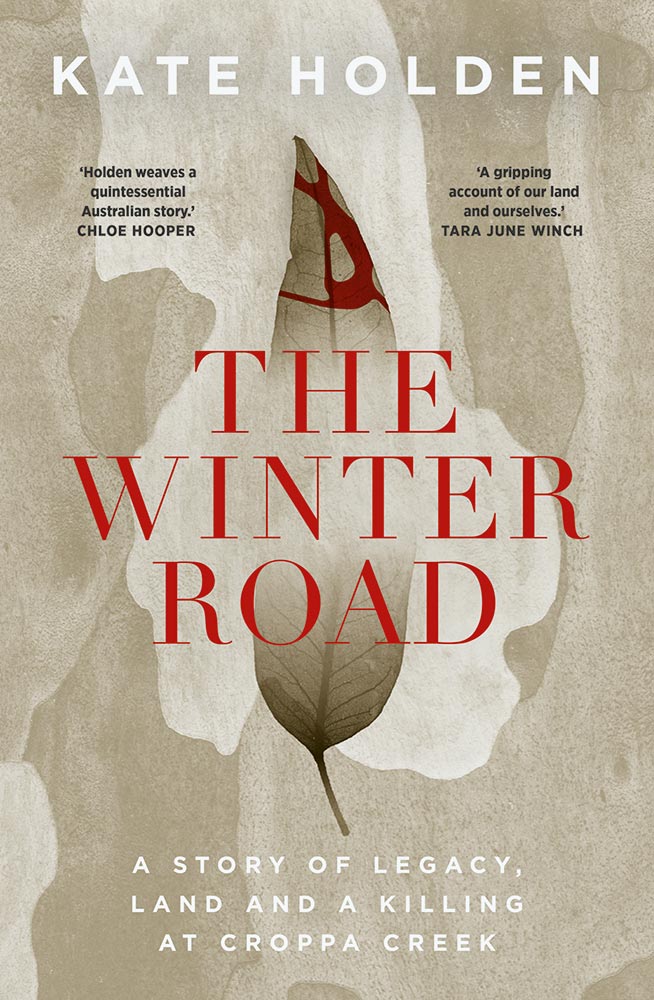
On a stretch of dirt road in outback New South Wales, 78-year-old farmer Ian Turnbull raised his hunting rifle, and aimed. The first shot knocked Glen Turner, a state environmental officer, to one knee.
As dusk fell on Croppa Creek, Turner and his workmate dived behind their ute, pleading with Turnbull, to no avail. In desperation, Turner turned to run. Once more, a shot echoed over the cleared farmland, this time striking Turner in the back. ‘I’m going home to wait for the police,’ the elderly farmer said, as he stepped into his ute. He drove off, leaving Turner dead in the arms of his partner.
Australia’s history with our land – the clash between farmers wanting to clear and work it, and those seeking to preserve it – runs deep.
Equal parts crime and history, The Winter Road is a gripping tale of legacy, land, and the killing at Croppa Creek.
Using the July 2014 murder of Glen Turner as a launching point, Kate Holden dives into the events that led to the killing, and the history that preceded it. The tension between Turner, a government man intent on enforcing environmental regulations, and Turnbull, a farming man who believes in the right to treat his own property as he wishes, speaks to broad ideas of ownership and government, of exploitation and preservation.
The result is a meticulously researched story of the continuing tug of war between land ownership, inheritance, enforcement, and preservation efforts in Australia. The Winter Road raises fundamental questions about the give-and-take relationship Australians have with the land – from First Nations ideals of continuity and preservation, to European notions of taming the land through work. It highlights the complex nature of the laws that govern land, and the dangers that those tasked with enforcing protection can face.
By deftly explaining the history behind invasion, settlement, and the traditions of preservation and farming, Holden tells a uniquely Australian tale. It captures deep and difficult questions about exploitation of the land we live on, and how it relates to our history, laws, and society.
The School: The ups and downs of one year in the classroom
Brendan James Murray
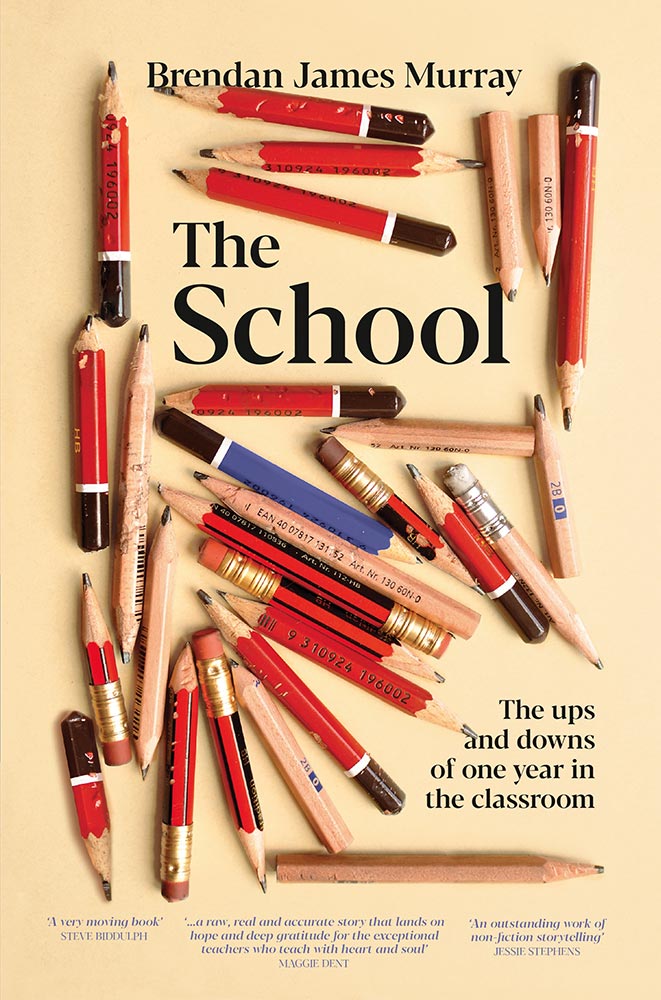
In the opening lines of The School, Brendan James Murray observes, ‘Schools are haunted. Ghost children flitter and lurk and whisper … no latest initiative, no departmental “best practice” will exorcise them.’
Politicians and policy makers talk a lot about schools, but how well do most of us know what really goes on inside them? Are we brave enough to look beyond the façade to the tangled web of social expectations, bureaucratic improvement plans, and complicated human currents that course through the classrooms and corridors, spilling out into the playground?
The School is a powerful story about a notional year in the life of a teacher. Murray draws on his experience as an English and Literature teacher at The School, a modest suburban secondary school on the edge of Port Phillip Bay, where he happened to spend his own days as a student.
As Murray warns us at the outset, ‘you will find these pages cluttered with souls jostling for your attention. That is the reality of teaching.’ These souls are vividly rendered, their voices urgent.
Murray writes compellingly about the burden of obligation – and the genuine gratitude – he feels towards his students, and the excitement of shepherding them toward new understandings. Nobody could read this account without reflecting on how profound an impact a good teacher can have on the lives of his or her students.
But this is no sentimental yarn. Murray reveals his frustration at the lack of resources at The School to tackle sometimes shocking levels of adolescent illiteracy, the heavy toll on young lives of poor physical and mental health, the radiating legacy of family trauma, the ease with which social cruelty and physical violence can be inflicted in the schoolyard, and the seeming indifference of a small handful of colleagues.
But Murray resists the temptation to lay blame neatly at the feet of the usual cast of villains: cynical politicians, heartless bureaucrats, neglectful parents, a few bad teachers, or troubled students. It is refreshing to read an account that acknowledges that these challenges are hard and defy simple explanation.
It is impossible to read this book without feeling a deep sense of obligation – and motivation – to keep asking what more, or what else, can we do to honour the ghost children who walk the grounds of The School.
On Money
Rick Morton
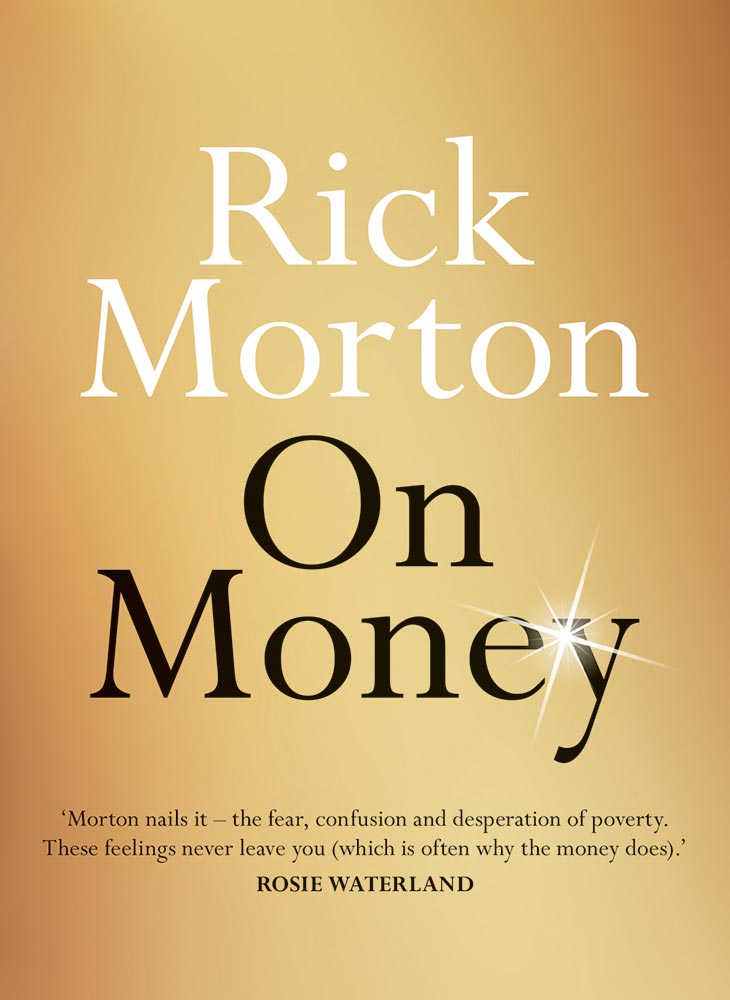
Author Rick Morton has carved out an impressive career in an industry that he himself describes as an elite cultural institution. But having grown up in poverty, Morton knows firsthand that the entry price for opportunity is not equal for everyone. For some like Morton – who grew up with nothing and had nothing to fall back on – every day is a fight for survival, and he describes the ‘cognitive tax’ that this imposes on the nation’s poorest. Often one financial mishap, traumatic event, or bad decision can kickstart a lifetime of cascading consequences; a reality that isn’t always understood by those born with privilege, who are afforded the ‘time and space’ that money provides.
These consequences, Morton explains, place heavy burdens on tired bodies, and on impoverished brains. He writes fondly of his weary mother who, having spent a life doing constant mental arithmetic, of ‘lifting and scraping and effort, effort, effort’, is old beyond her 60 years. Extrapolate this weariness across the 700,000 Australians that the Productivity Commission estimates live in persistent disadvantage, and it’s clear that the lifelong physical and mental health costs of economic inequality are urgent policy issues that demand intervention.
Morton identifies the tangle of welfare systems and institutions, of political pledges and punishments, that has created an environment where attitudes towards people living in poverty have shifted towards using money as a measure of moral character and worth. We are assured that those who ‘have a go, get a go’, yet the gap between rich and poor gets wider, with persistent poverty exacting an especially large toll on the children of single parents.
On Money meticulously describes the implications of financial hardship, and the policies that exacerbate it, through the eyes of someone who has lived it. Morton has written a piercing and personal piece, a deeper look at how his experiences as a child (recounted in his brilliant memoir One Hundred Years of Dirt) shaped his relationship with money. It perfectly explores how a life spent choosing from a ‘restricted buffet’ can cause damage across generations.
Rick Morton is a national treasure, and On Money is a shining gem of insight into systemic inequality. We are all richer for his work.
System Error: Where Big Tech Went Wrong and How We Can Reboot
Rob Reich, Mehran Sahami, and Jeremy M. Weinstein
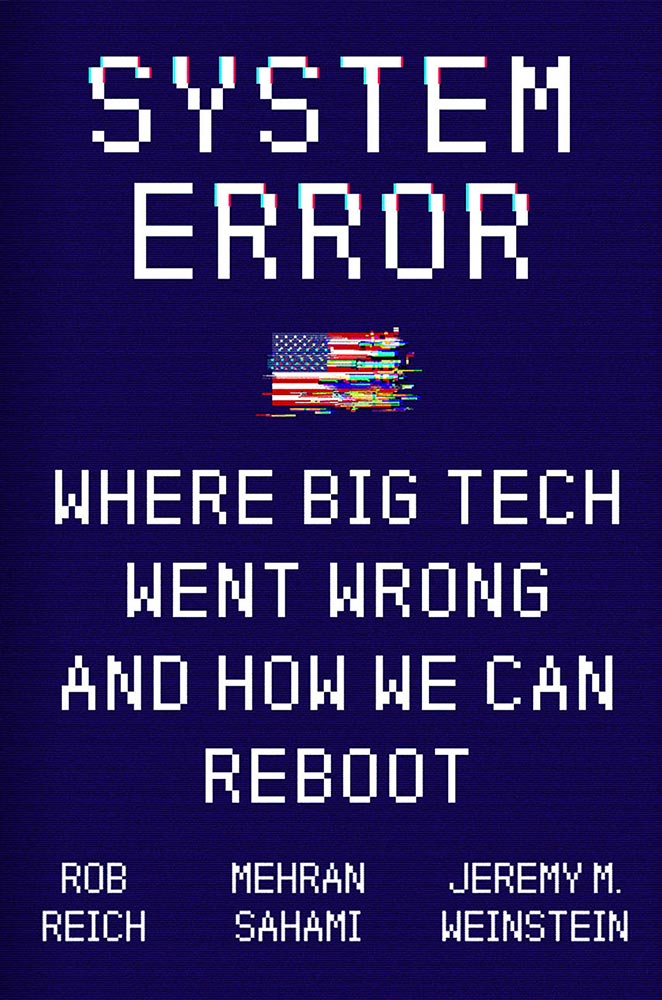
It’s been a big year for big tech. While negotiating new media laws, Facebook banned Australian news sites, the ban reaching well beyond news to government and not-for-profit pages. Anti-vaxxers used the internet to spread health misinformation. And the world was confronted with the terrifying power of social media used to mobilise the attack on the US Capitol building.
Considering these incidents, governments around the world face a significant challenge: how to regulate an industry that runs faster than the rules can be made.
While many books have attempted to capture the Sisyphean task facing policy makers in regulating big tech, few have succeeded as well as System Error.
The three authors outline how the often-libertarian beliefs of technology professionals lead to unregulated technology markets that come into conflict with democratic ideals. Many of these issues stem from an optimisation mindset, built into computer programmers and the start-up elite at university. Technologists see their job as solving the problem in the most efficient way. But siloed development means no one’s looking at the big picture of the ethical implications of optimisation.
Where some books take a ‘democracy good, big tech bad’ approach, it’s the nuance and complexity of System Error that holds it above other offerings. The book explores the all-pervasive nature of big tech to touch every aspect of the democratic process. Lobbying against privacy and media laws, the impact on the gig-economy, and the increasing monopolies of the big five, are just some examples given here. But the book also shares the lessons big tech can teach governments about agility in times of crisis – including how to make a COVID tracing app that people might use.
Although System Error is written from a US perspective, the book highlights the need for a global approach to regulating big tech. After all, these companies may be based in the US, but their effects are felt worldwide.
Australia might be well placed to test some of the recommendations, as a middle-power, English-speaking country relying on globalisation. In fact, Australia’s media content laws trying to extract revenue from Google and Facebook are exactly that, on a small global scale. The authors also point out that few policy makers have technological backgrounds. As a starting point, Australia needs more digital experts in parliament and the public service.
A book on technological policy might sound like a dry read: this one’s not. The authors spin a compelling argument that has implications for all of us. You might think twice the next time you click ‘like’.
She Is Haunted
Paige Clark
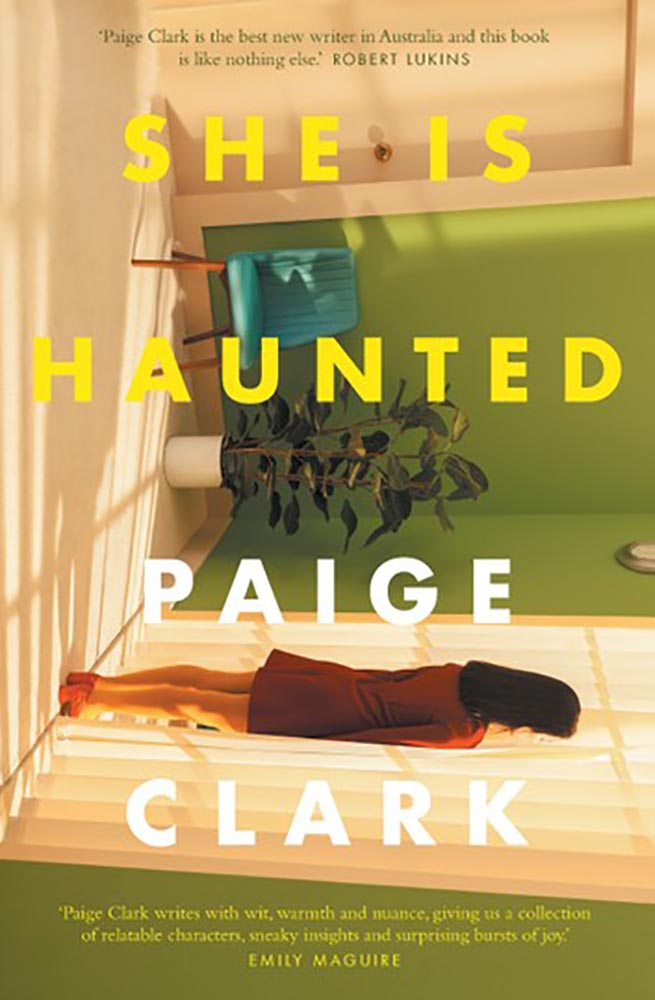
Melbourne’s Paige Clark has burst onto the literary scene with her debut collection of 18 short stories, She Is Haunted. The book is an ethereal work that deftly explores relationships, loss, and grief. Clark, who is third-generation Chinese-American, and first generation Australian, weaves her own experience of the transnational identity via excruciatingly relatable characters. Each story is written with a piercing dry wit, entwined with pathos-laden gut punches. Most of Clark’s protagonists are women, and in a year when the voices of Australian women were given prominence, She Is Haunted is a timely, refreshing, and deeply intimate experience.
Clark’s writing is spare but her attention to the minutiae of life is evocative. She has interwoven the mystical and the mundane, depicting the surreal and the ordinary throughout the lives of her characters, who are all fallible but mostly sympathetic. A widowed woman self-soothes with clothes left behind, transforming physically into her late husband to avoid grieving his loss. A Woman in love is split from her beloved and elderly dog after her marriage ends. High-jinks ensue as she embarks on a ‘dog-napping’ escapade so she can clone the toothless chihuahua, but we are privy to a past of devastating genetic testing results, and the comfort the elderly dog brought. A woman and her partner voluntarily undergo removal of their left frontal cortex to withstand oppressive heat wrought by a heating planet: indeed, menacing hints of climate change stalk many of Clark’s stories.
She Is Haunted is a like a cosmic prism through which readers can view life and death. Spirits and the spiritual haunt carefully crafted vignettes, windows into souls that are grieving, bargaining, lost, jealous. Whilst loss and death are constant throughout the book, Clark’s nimble prose keeps readers curious, with surprising deviations crafted within each chapter.
Paige Clark has created a dazzling debut, and if She Is Haunted is any indication, we look forward to what’s in store from this talented young Australian author.
Truth-telling: History, sovereignty, and the Uluru Statement
Henry Reynolds
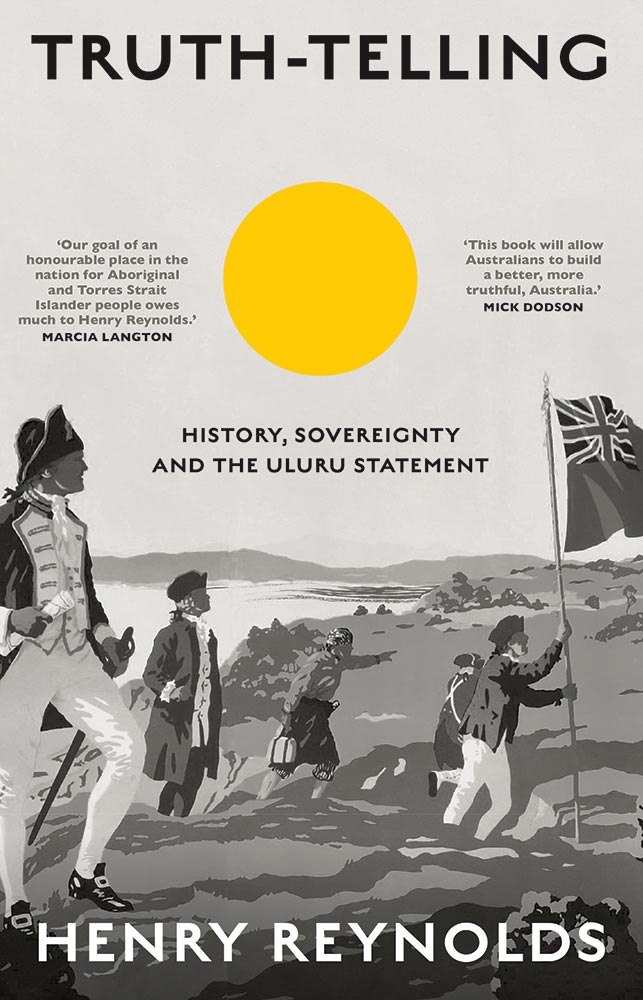
The Uluru Statement from the Heart speaks with the powerfully united voice of First Nations Australians and calls on all Australians for truth-telling: telling the truth about our history.
It is nearly 250 years since the arrival of the British, and yet in many ways we are still resisting the truth of our past.
In his new book, Truth-telling, Henry Reynolds makes an important contribution to this truth-telling process, drawing on his long career as an Australian historian.
The book is a piece of revisionist history that begins in 1788, and carefully steps through the legal concepts of sovereignty and property law within the context of the international law at the time, laying bare how the ‘scale of the expropriation was without precedent’.
Reynolds presents a wealth of evidence, including letters from the Colonial Office in London – which oversaw the colonial affairs of Britain – that demonstrates how the colonists’ violence and legal overreach went beyond what even the Colonial Office deemed acceptable.
Documents show that the British government had acknowledged that First Nations Australians were proprietors. Yet this did not stop the land theft by colonists in Australia.
Britain claimed the benefits of the sovereignty it asserted over the land, first in New South Wales, ‘which would have been found illegitimate in international law’. But the British did not always uphold their responsibility that came with that – which was to provide protection from harm to all sovereign subjects, including Indigenous Australians.
Instead, Reynolds argues that Britain ‘turned their back on the tradition of treaty-making fully conscious of what they were doing’. The British government had created a situation where ‘tension could only be relieved by violence’. He provides evidence that the number of Indigenous people killed may be even higher than previously thought.
A common refrain about Australia’s past is that colonisation, while brutal, ‘was acceptable behaviour at the time’. This book demands that Australians reject this false truth about Australia and face up to the real truth of our past. Only then can we genuinely engage with the Uluru Statement from the Heart and move forward firmly and constructively.
While you’re here…
Grattan Institute is an independent not-for-profit think tank. We don’t take money from political parties or vested interests. Yet we believe in free access to information. All our research is available online, so that more people can benefit from our work.
Which is why we rely on donations from readers like you, so that we can continue our nation-changing research without fear or favour. Your support enables Grattan to improve the lives of all Australians.
Donate now.
Danielle Wood – CEO
